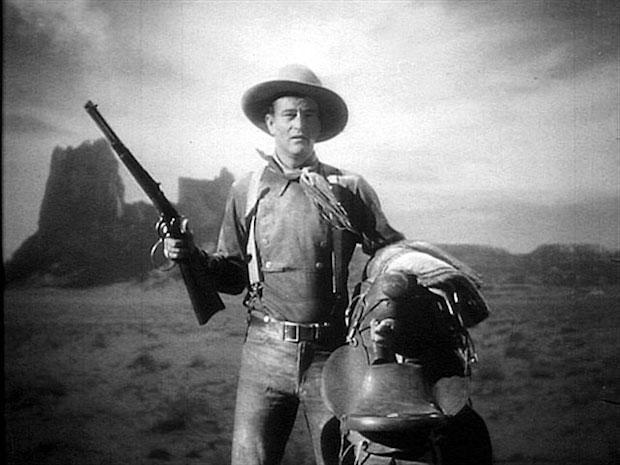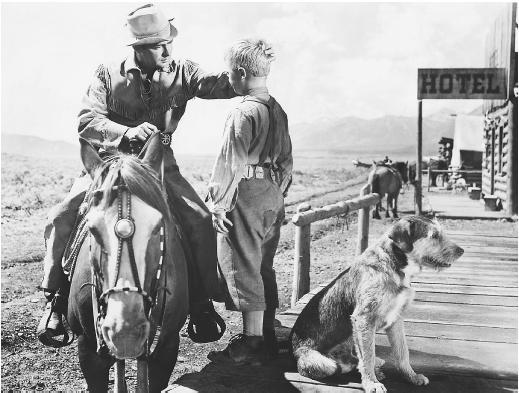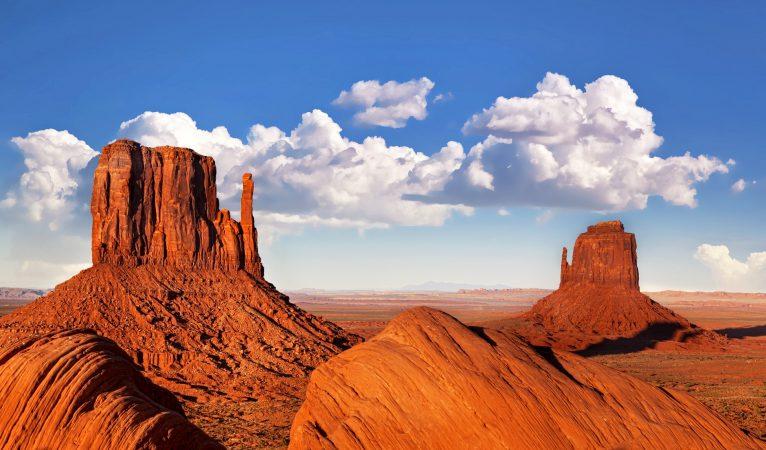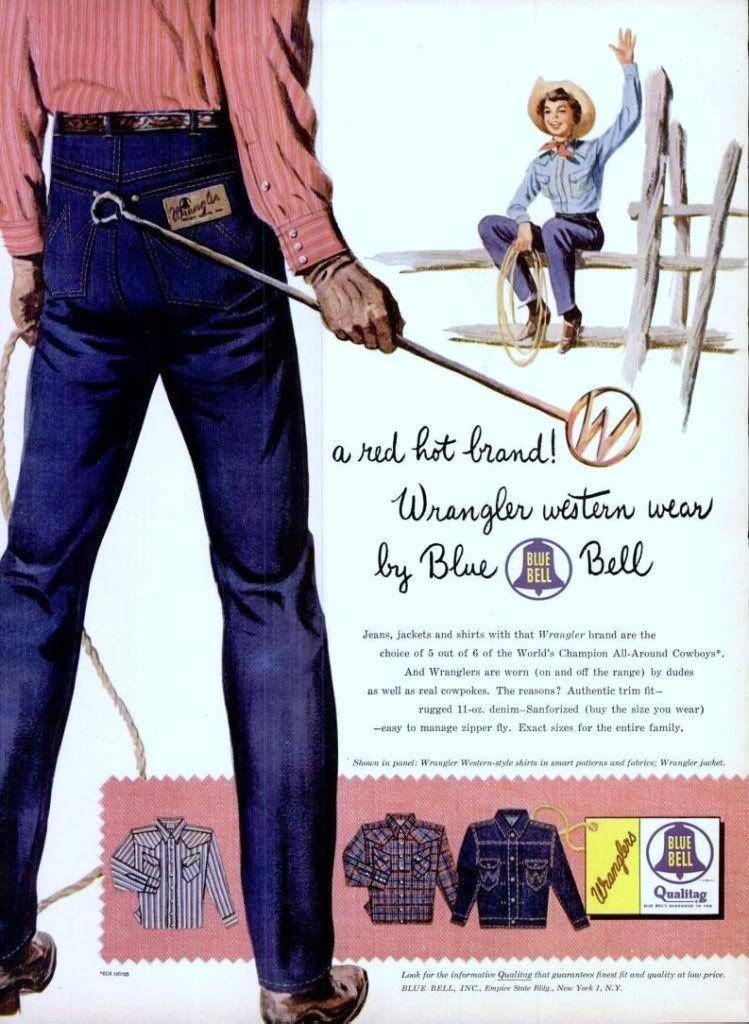
As it happened, I didn’t grow up to be the kind of woman who is the heroine in a Western, and although the men I have known have had many virtues and have taken me to live in many places I have come to love, they have never been John Wayne, and they have never taken me to the bend in the river where the cottonwoods grow. Deep in that part of my heart where artificial rain forever falls, that is still a line I wait to hear.
Joan Didion, Slouching Towards Bethlehem
Listen my children and you shall hear the tale of a holy loner, who, lifting lantern and gun, undertakes an errand into the wilderness.
It is early in the century that America will call its own. A cup of coffee costs a nickel. A haircut, a dime. Hollywood sound stages and backlots are lousy with pretend cowboys. R.K.O, Warner Brothers and M.G.M. issue paychecks to contracted photogenics who perform easily filmed, idiosyncratic pieces of schtick. This one sings, plays the guitar and whistles at a fake moon that follows him like a trained, celestial dog. This one is good with a lasso and can round up a whole gang of lawbreakers with a single swing of his unerring rope. This one cracks jokes, slaps his knee with a dusty hat, and shows off his trademark, ear-to-ear, toothless smile.
Try as they might, they know they are not, nor will they ever be, John Wayne.
He is the actor who doesn’t seem to want to act. Or can’t act. It is as if someone has forced him to stand in front of the camera. He is acting, though, of course, executing a much-more-difficult-than-it-looks, masterful, sleight-of-blank-face lifted from his sometime pal Gary Cooper. And the seeming inability to lie works. He plays the same sparse, meticulously assembled persona again and again, in movie after movie, iteration after iteration.
He starts to seem real.
Genuine. Spontaneous. True. A fact of nature. Like a gnarled tree, emerging from a cloven rock in an unforgiving landscape where the sun withers away all excess.
He must act likewise. Only move when absolutely necessary, and if you do make it very slow or very fast, as if each move may be your last. If fast: it is exact and overwhelming. Like that of a coiled rattlesnake lashing out at prey. If slow: conserve your energy, husband your every effort. Don’t drink that whole canteen all at once, Pilgrim, just because you’re thirsty. There are a hundred miles of chaparral yet to cross and soon enough you’ll treasure every drop.
He walks awkwardly, without pride. He needs no approval. No more than a cloud of dust needs approval. You and the dust cloud are alone out here. No one is going to give you a badge out here. The only thing giving out badges is you, yourself, in your own mind, pinned to your own heart. If he walks stoop-shouldered and tilting forward sometimes, that’s because the weight of existing in this survival-of-the-fittest world weighs upon his lean frame. The saddlebags of right and wrong burden his physical being, the earthly representation of his conflicted, troubled spirit.
He refuses to use big words, though. Words, large and small, get in the way.
So he rarely speaks at all.
Weathered. Untamed.
Wary. Stoical.
The invisible fifth face on Mount Rushmore.

Lone Pine (California).
Moab (Utah).
Jackson Hole (Wyoming).
Monument Valley (Arizona).
Each an imaginary setting and an actual place.

Accepted on a writ of error, the Supreme Court of the United States, in 1832, hears the case Worcester v. Georgia. At issue: do Native Americans own the land upon which they live?
Writing for the majority, Chief Justice John Marshall:
…the Indian nations had always been considered as distinct, independent political communities, retaining their original natural rights as the undisputed possessors of the soil. The very term ‘nation’ so generally applied to them, means ‘a people distinct from others.’
The Supreme Court of the United States thus establishes the sovereignty of tribal lands. A military invasion of that territory is therefore an act of war. An assenting justice in the case, Joseph Story, sends a letter to his wife which reads, in part: “Thanks be to God, the Court can wash their hands clean of the iniquity of oppressing the Indians and disregarding their rights.”
President Andrew Jackson differs. He sends a letter to a friend, writing that the decision of the Supreme Court “has fell still born….” Acting in his capacity as the commander in chief of the American military, ignoring the court’s ruling, Jackson fixes his signature to an executive order enforcing the expulsion of the native population from the southern half of the United States to an area to the west called “Indian Territory,” later known as the Oklahoma Territory, and known later still as the state of Oklahoma.
Some march, by force, over a thousand miles to reach the newly designated, flat, treeless world. Once those still alive arrive, they are taught in schools how to decipher a series of characters known as an alphabet, how to hold a pencil, how to speak plainly, how to add and subtract, and how, by studying certain symbols in a certain book, to know the identity of God: which, according to the book, is neither John Marshall nor Andrew Jackson. Many of those who refuse to obey the rules set forth in the book are killed for their disobedience.

“Manifest destiny.”
Journalist and newspaper editor John O’Sullivan coined the phrase in 1845. It captures a conviction that glosses a century of colonial expansion. A verbal anchor for the heartfelt, pervasive belief that the government and citizens of the United States have been divinely ordained to stampede across the North American continent–no matter the cost to principles or to life–and to claim it as their own.
Making his argument for the annexation of Texas, then still part of Mexico, O’Sullivan writes:
And that claim is by the right of our manifest destiny to overspread and to possess the whole of the continent which Providence has given us for the development of the great experiment of liberty and federated self-government entrusted to us.

O’Sullivan is more than a theo-political visionary. He’s a prophet of technology, too. He foresees a unification of the telegraph and the printing press, a mechanical and human amalgam that will mediate and compress time and space, that will maximize national identification and minimize the continental expanse geography, and bring all of the republic’s far flung citizens together in a moment of communal glory as the country listens, as one, to the words of the leader. O’Sullivan in the New York Morning News, advocating for the annexation of Oregon Country, then a territory of Great Britain, writes:
The day cannot be distant which shall witness the conveyance of the representatives from Oregon and California to Washington within less time than a few years ago was devoted to a similar journey by those from Ohio; while the magnetic telegraph will enable the editors of the “San Francisco Union,” the “Astoria Evening Post,” or the “Nootka Morning News,” to set up in type the first half of the President’s Inaugural before the echoes of the latter half shall have died away beneath the lofty porch of the Capitol, as spoken from his lips.
Manifest Destiny: a will-to-possess nearly impassable mountain ranges, a will stopped only by lines drawn in the dirt at the conclusion of hard-fought wars. By absolute, geographical borders, north and south, east and west. By the wild majesty of two oceans. By the greatness of interlocking glacial lakes. By rivers’ roiling pathways and cascading waterfalls. By the volatile storms that churn the Gulf of Mexico.
Let’s all go to the bend in the river where the cottonwoods grow.
Through those mountain passes, over those rushing rapids and frozen lakes, and through those vaporous optical illusions that tremble just above the horizon.
Let’s wander together through the desert to Hollywood so that we may find our homeland.
Who will be our guide? Who will take us there?
(Once we get there, we will happily live by the laws he hands down.)
Let’s give this prophesied Western hero a name.
(The renegade seeker? The volunteer conquistador? The malcontent on a mission?)
Let’s call him the cowboy messiah.

Arriving on horseback, he delivers the law spoken to him by the very stones themselves.
(No more hollow decorum. No more civilized tyranny.)
The cowboy messiah is a revolutionary. His actions may sometimes seem too sudden, too brash, too free. This is to be expected. Although he may startle and confuse us from time to time, we may take on faith that he knows the difference between good and evil–and that he knows he must sometimes wince and grind his teeth and grudgingly employ what may first seem like evil so to bring about an ultimate good–and that he acts according to the highest plan of all.
He can do no wrong, in other words. If one must use words.
The terrain is rough, but the cowboy messiah will draw us a map of redemption country. He talks with God, one-on-one.
In this lonesome landscape, maybe you, too, speaking up to the star-thick heavens from your patch of land, are a cowboy messiah.
All it takes is enough grit and imagination.
Are you ready, tenderfoot?




